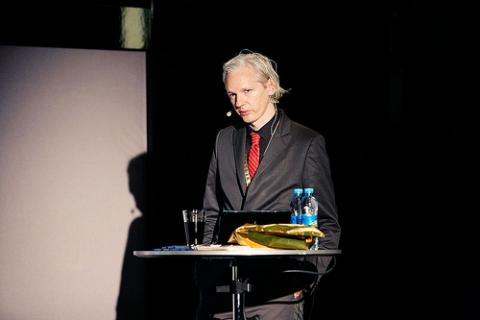Julian Assange - hero or charlatan?

Paul McElhinney sees similarities between the case of Julian Assange and the Dreyfus Affair.
As the dust has settled (at least, temporarily) on the events surrounding the Wikileaks revelations of earlier in the year, it is probably a good time to stand back and try and draw some overall meaning from those events.
At one level, Julian Assange was the fearless searcher after truth, taking on the might of the US government and its agencies. He showed immense courage in challenging US authority, given the potential consequences for him personally. This view of Assange has wide appeal in an age where the actions of governments are either remote from, or directly inimical to the interests of the average citizen.
Another view of Assange is that he is an egocentric trouble-maker. Former colleagues have gone public in detailing character defects which tend to cast doubt on his ‘tribune of the people’ self-image. At a substantive level, one could question the wisdom of publishing material that could put lives in danger or threaten a state’s national security.
Assange could, therefore, be held to account on two grounds: motive and effect. If his motives were sound, does that excuse any negative effects arising from his revelations? If there are no negative effects, is the question of whether his motives are altruistic or malign even relevant? These conundrums will probably keep the pundits exercised for some time to come.
The issue of free speech is at the heart of the matter. So is the conflicting issue of taking responsibility for (or at least account of) the wider ramifications of what one publishes. We obviously can’t have everyone acting on the belief that all information should be in the public domain, regardless of potentially dangerous effects. Nor can we have public institutions behaving with Stalinist secrecy and evasion. The great American jurist, Oliver Wendell Holmes, a great supporter of the US First Amendment, once said that freedom of speech did not extend to being permitted falsely to shout ‘Fire’ in a public auditorium.
The allegations about Assange’s private life in the wake of the explosive Wikileaks revelations, on the surface, seemed dubiously-motivated - Assange had exposed the US authorities to major embarrassment and ridicule and was going to have to pay for his effrontery. These revelations only served to enhance his ‘ injured martyr’ status.
On the other hand, someone who makes his living by revealing embarrassing facts about others can hardly complain if the media spotlight is then turned on him. Like anyone, he also has the right to defend his reputation and to expose any lies against himself, if lies they are found to be. The legal process is now running its course and in time we may be made a little wiser regarding the truth or otherwise of the allegations against him.
The whole affair also highlights the role of the new social media in today’s world. Control of the flow of information in such an environment is impossible. Governments are virtually powerless here, unless you have the overweening attitude, for example, of the Chinese government. Importantly, quality control of content and the verification of facts are also virtually impossible.
In an attempt to counter this mass explosion of free information, government officials now commit far less to paper (and after Wikileaks, will commit even less). In the eyes of the bureaucrat, something only exists if it is on paper – everything else is ultimately deniable. Assange now faces the challenges of all whistleblowers. His future life will involve continuously looking over his shoulder. He may well now ask himself, has it all been worth it?
In many respects, the Assange case compares with the Dreyfus Affair: the lone figure against the establishment; entrenched interests vs. the rights of the individual; order and stability vs. freedom and transparency. Like the Dreyfus Affair, the Assange case is a ‘cause celebre’ that has attracted strong partisans on both sides. Dreyfus felt, at times, that his cause was being hi-jacked by more zealous interests, without reference to his own concerns. This is the acute danger for the individual in such causes: concern for the cause often surpasses concern for the interests of the very individual at the heart of it. Assange will need a strong stomach.
Image top: New Media Days/Peter Erichsen.
